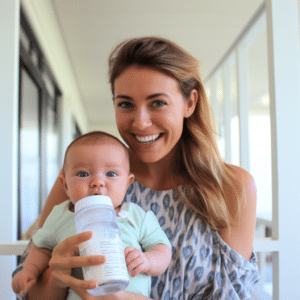Best Hydrating Drinks For Breastfeeding
Hydration Tips for Breastfeeding Moms: Breast milk is about 90% water. When a mother does not take enough water while breastfeeding, she is at risk of dehydration. Professionals recommend mothers exclusively breastfeed their babies for six months. When a mother breastfeeds her baby, she loses a certain amount of water from her body.
When she does not take in enough fluids, she ends up dehydrated. Some signs of dehydration in a nursing mother include; dark urine, cramping muscles, failure to produce enough milk, fatigue, headache, and confusion. Dehydration may reduce milk production, which affects the baby, especially one who has not weaned.

Why Should A Mother BreastFeed
Breastfeeding is essential to both the baby and mom. Mother’s breast milk aids in boosting immunity, is easily digestible, contains all essential nutrients the baby requires and is readily available. The milk comes at the right temperature, has minimal chances of infection, and is cost-free. To the mother, breastfeeding can help reduce the risks of breast and ovarian cancers, reduces the risk of osteoporosis, may help in burning calories, and helps the uterus to contract to its pre-birth size. Dehydration, therefore, should not make mom and baby miss these benefits.
Best Hydrating Drinks
Water
Water is one of the best hydrating drinks for a nursing mother. A breastfeeding mother should take slightly above the daily recommendation. The main advantage of water is that it’s readily available and cheap.
Water improves physical performance, boosts energy levels, relieves constipation, regulates temperatures, prevents infections, and may help with kidney stones. Excessive water consumption causes overhydration characterized by; Headache, nausea, vomiting, confusion, or disorientation. When not controlled, the sodium levels can go down, causing health problems. Try to moderate your water intake and consult a health professional when in doubt.
Infused Waters
Plain water may sometimes get boring. When you need flavors in your water, you may consider infusing your water with fruits. Berries, melon, cucumber, mint, and lemon are some great ingredients you could use. Infused water boosts your energy levels and satisfies sugar cravings without eating or drinking unhealthy drinks or snacks.
The benefits of infused water include; blood sugar regulation may prevent heartburn, and may improve digestion. However, excessive use of infused water can cause tooth decay and erosion. When not properly prepared, it can also cause food poisoning.
Herbal Tea
Herbal tea may help prevent dehydration in a breastfeeding mom. There is evidence that consuming herbal tea often is beneficial to the body. A breastfeeding mother needs good health for her and her baby’s benefit. Benefits of infused water include; Having antioxidant and anti-inflammatory properties, boosting immunity, improving digestion, and may help in weight loss. Examples of herbal teas include; green tea, chamomile, jasmine, rooibos, lemon, and hibiscus tea. Herbal teas are easy to prepare and are readily available.
Juices
Fruit and vegetable juices are a great way to rehydrate. Juicing enables the body to absorb nutrients quickly without digesting the fiber of the whole fruit. Juices have the potential benefit of boosting immunity, decreasing inflammation, increasing energy, aiding weight loss, and increasing vitamin and mineral intake. Home-prepared juices are a better option because they do not contain harmful preservatives.
The downside of juicing is that it denies the mother essential Hydration Tips for Breastfeeding Moms components of whole fruit or vegetable. Your body requires fiber for improved digestion. Juices can also spike the blood sugar followed by a sudden crash which is bad, especially for diabetic mothers. It is therefore advisable to restrict juice intake to the minimum. You might consider increasing the consumption of whole fresh fruits and vegetables.
Coconut Water
Coconut water contains plenty of electrolytes and flavor. It is a clear liquid that is extracted from a young coconut. Coconut water is different from coconut milk which is milky and contains coconut flesh. Coconut water has myriad health benefits; an excellent source of electrolytes, promotes healthy skin, may prevent kidney stones, high in potassium, and helps minimize added sugar intake.
Though beneficial when consumed in large amounts, it can act as a laxative countering its benefits. It can also cause electrolyte imbalance and can cause an allergic reaction in some people. Its diuretic properties might also lead to dehydration due to increased urination.
Milk
To Milk is an excellent thirst quencher that can be animal or plant-based. The Milk is a good source of nutrients; proteins, carbohydrates, sodium, and potassium. You may consider drinking low-fat milk, which is better in comparison to whole-fat milk.
Dairy milk comes from domesticated animals such as cows, goats, camels, sheep, and donkeys. Plant-based milk includes soy, coconut, almond, and rice, among other sources. Milk can cause allergies, and thus one needs to be on the watch out in case of any reaction.
Soups And Broths
Soups and broths are a great way of rehydrating breastfeeding mothers, especially in cold seasons. Bone soups can help replenish nutrients lost during pregnancy and birth, improve bone density, and help lubricate joints. Soups and broths are prepared with vegetables, meat, chicken, and beans, among other ingredients.

Drinks To Avoid While Breastfeeding
Some drinks may not be the best choice for a nursing mother. A mother may minimize her consumption of caffeinated drinks such as sodas, sports drinks, coffee, tea, cocoa, chocolate, and energy drinks. Caffeine is passed through breast milk, and young babies cannot break it down. It may cause stomach upset in the young one. A breastfeeding mother should also consider reducing alcohol consumption.
Hydration Tips for Breastfeeding Moms, breastfeeding is beneficial to mom and baby. A mother loses water through breasting, and natural liquids can help rehydrate. A nursing mother might consider minimizing her consumption of caffeinated drinks and alcohol that may negatively affect her and the baby.






